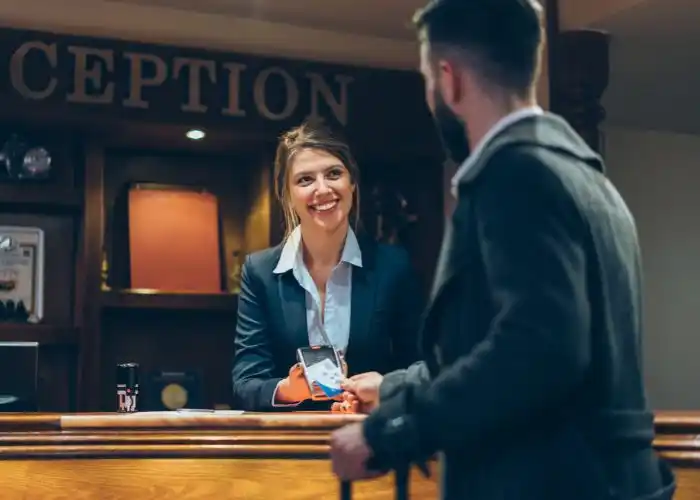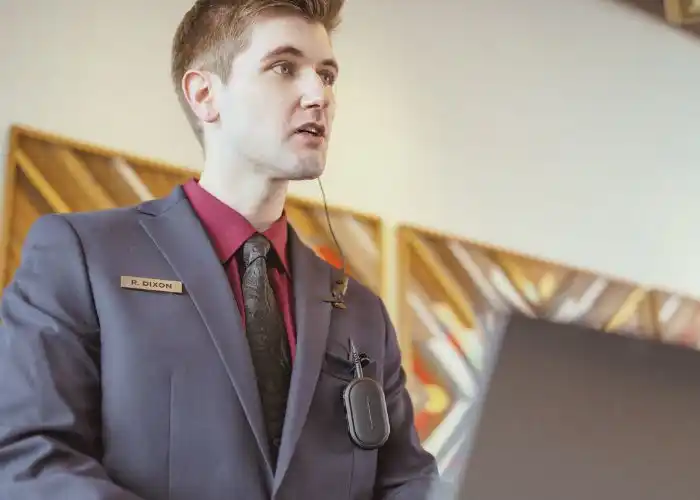Communication is one of those things that is often overlooked in many industries. Sure, we know it is important. But figuring out how to break down communication silos and putting in place standard operating procedures related to how people talk to one another, isn’t all that easy.
Unfortunately, in the hospitality industry, a miscommunication can mean a dissatisfied guest. And trust us, their displeasure with their stay at your property isn’t something they’ll keep to themselves. They’ll be sure to tell others that they had a bad experience. They’ll share their comments on social media, too, and negative publicity isn’t good for any hospitality business. This is why building a detailed and easy-to-follow communication strategy is such a non-negotiable. Thankfully, EMCI Wireless and Motorola two-way radios can help.
Does Your Hospitality Business Have an Effective Communication Strategy?
Efficient communication is the backbone of everyday operations in any business. Clear and concise communication keeps all team members on the same page, leading to better coordination, efficiency, and overall productivity. This is particularly important in hospitality, where timely service and quick response to guest needs take center stage.
Consider this—nearly half of workers report their productivity being affected by ineffective communication. When information flows smoothly, staff can anticipate and meet guest needs promptly, creating a better guest experience. When communication is slow, interrupted, or non-existent, it can erode that customer experience and impact guest loyalty.
The Impact of Communication Breakdowns: A Risk No Business Can Afford
Think of the last time you stayed at a hotel and ran out of clean towels for the bathroom. What did you do? You likely called down to the front desk, asking them to connect with the housekeeping department to send up some clean towels. And what happened? The towels didn’t arrive. So, 30 minutes later, you called down to the front desk again to reiterate the request. You are informed that they are trying to get in touch with someone from the housekeeping department.
This situation can be so frustrating. You know you could have walked down to the front desk to get some clean towels. But, you figured this was a simple request and as part of the guest experience, you know that the property can deliver. Yet, this waiting time is keeping you from doing something you want to do. You either can’t take that shower you wanted to get in before going to bed. Or, perhaps you need those towels to clean up before heading to your daily activities. Either way, the wait is slowing you down.
Chances are that the reason the towels didn’t arrive promptly is because of a communication breakdown. And this is just one example of communication breakdowns that take place every day in the hospitality space, despite the best of intentions. Misunderstandings, errors, and delays caused by poor communication can lead to frustrated guests, negative reviews, and lost business.
Why Communication is the Lifeblood of the Hospitality Industry
The hospitality industry thrives on providing exceptional customer experiences, and clear communication is necessary to achieve this goal. Hospitality work is fast-paced, with staff needing to coordinate tasks like room service, maintenance, and guest requests in real-time. Without constant and clear communication, small issues can quickly escalate into larger problems.
When customers are unhappy, there’s a 91% chance they won’t do business with a company again. Moreover, dissatisfied customers typically tell nine to 15 other people about their experience; some tell 20 or more. A poor customer experience can contribute to approximately 86% of consumers quitting business with a company—and trust us, it’s easy to find a different hotel for your next stay or a different restaurant for your next meal out. In today’s world, consumers are more demanding than ever before, expecting quick responses and the very best in customer service.
Think back to that scenario where you wanted some clean towels. If the front desk cannot promptly communicate this request to housekeeping, you will have to wait longer than necessary. This delay can leave a negative impression, making you feel undervalued, and delaying whatever it is that you wanted to do next. With real-time updates and responses, such as those provided by two-way radios, staff can make sure requests are handled quickly so you don’t have to wait.
In the hospitality industry, every interaction matters. Quality and expedient communication makes sure guests’ needs are met promptly.

Key Conversations That Drive Exceptional Guest Experiences
In the hospitality industry, many types of communication occur daily, each playing a big role in creating a positive guest experience. These interactions must be clear, timely, and courteous to meet and exceed guest expectations. Let’s explore some key conversations that contribute to exceptional service:
Front Desk to Housekeeping
- Communication between the front desk and housekeeping is super important for room readiness and cleanliness. When guests check-in, they expect their rooms to be spotless and ready. The front desk needs to relay check-out times, special requests, and cleaning priorities accurately to housekeeping staff.
- Timely updates on room status help prevent delays in check-in and maintain guest satisfaction.
Concierge to Maintenance
- The concierge often coordinates with the maintenance team to address issues such as faulty air conditioning, plumbing problems, or broken appliances in guest rooms.
- Efficient communication prioritizes prompt resolution to minimize guest inconvenience.
Staff to Guests
- Direct communication between staff and guests includes everything from answering questions and giving directions to handling special requests and resolving complaints.
- Courteous and informative interactions leave a lasting impression, making guests feel valued and appreciated.
- Listening to guest feedback and acting on it can turn a potential negative experience into a positive one.
Internal Staff Communication
- Within the team, internal communication keeps everyone informed about daily operations, upcoming events, and special guest needs.
- Regular briefings and updates help staff stay prepared and responsive, creating a smoother operational flow.
How Two-Way Radios Simplify and Speed-Up the Flow of Communications
So, just how does staff manage these communications in such a busy industry? How does each team communicate with the other? The answer may surprise you—two-way radios are a lifeline for fast, reliable, and discrete communication.
Advantages of Using Two-Way Radios
Motorola two-way radio solutions offer several advantages for the hospitality industry:
- Reliability: Unlike mobile phones, which can suffer from signal issues and battery problems, two-way radios are designed for constant use in demanding environments. They provide consistent communication, even in areas with poor cell reception.
- Immediacy: Two-way radios allow for instant communication. There’s no need to dial numbers or wait for connections. Staff can press a button and talk directly to the person they need, saving valuable time.
- Clarity: Motorola two-way radios are built to deliver clear audio, even in noisy environments. This confirms messages are heard and understood correctly, reducing the risk of misunderstandings.
Comparison with Other Communication Tools
- Mobile Phones: While mobile phones are versatile, they are not always practical in a fast-paced hospitality setting. Calls can go unanswered, texts can be delayed, and phones can be misplaced. Two-way radios are more reliable for immediate communication and are less likely to be lost or damaged.
- Intercoms: Intercom systems are useful for fixed locations but lack the portability needed in large hotels or resorts. Portable radios allow staff to communicate from anywhere on the property, providing greater flexibility and coverage.
Motorola two-way radio solutions and two-way radio accessories, like earpieces and microphones, make communication even more efficient. They enable staff to stay connected while keeping their hands free for other tasks, further improving productivity and response times.

EMCI Wireless: Your Partner in Superior Communication Solutions
So, how can EMCI Wireless help hotels, restaurants, and other key players in the hospitality space to improve their communication and improve the guest experience? We’re so glad you asked.
For over 48 years, EMCI Wireless has been a reliable provider of wireless communication solutions. With our extensive experience and strong partnerships with Motorola Solutions, we are the go-to choice for businesses and organizations seeking to implement mission-critical or commercial wireless networks. Our comprehensive services include system design, integration, and ongoing maintenance and support, guaranteeing that your radio network remains operational at all times.
Established in 1975 with headquarters in Sebring, Florida, Electronic Maintenance & Communications, Inc. (EMCI Wireless) is now one of the biggest Motorola Solutions Channel Partners in the state. As of the end of 2023, there were an estimated 494,122 hotel and motel rooms in Florida across 4,659 properties, with 129.1 million domestic visitors choosing to come to Florida in 2023, along with 8.3 million overseas visitors and 3.2 million Canadian visitors.
By choosing EMCI Wireless for your hospitality communication needs, you benefit from:
- Expertise and Experience: Decades of industry knowledge to design and implement the best communication solutions.
- Reliability: Dependable systems and equipment that provides highly reliable continuous, clear communication.
- Comprehensive Support: From installation to ongoing maintenance, we’ve got you covered.
- Advanced Technology: Cutting-edge Motorola two-way radio solutions and accessories tailored to your needs.
Integrate EMCI Wireless Solutions into Your Hospitality Operations Today!
Why leave communications up to chance? And why risk a poor guest experience that could easily be avoided with the right two-way radios and service level training? Don’t let your business suffer and lose more guests. Contact EMCI Wireless today for a free consultation. In the meantime, check out our free planning guide.






